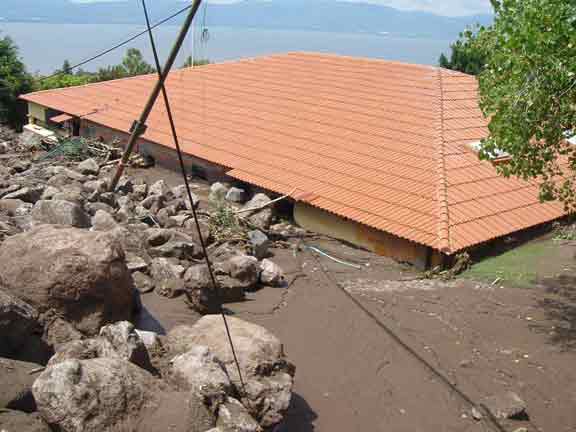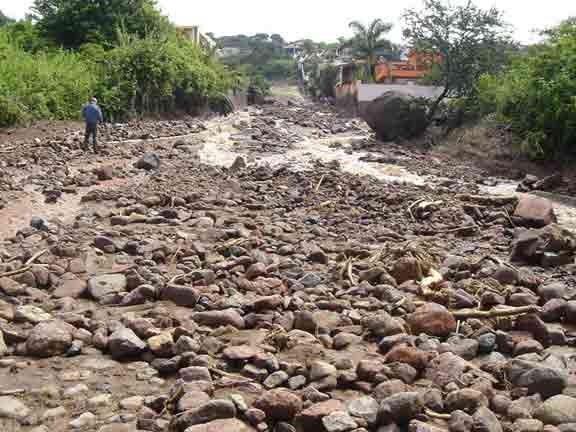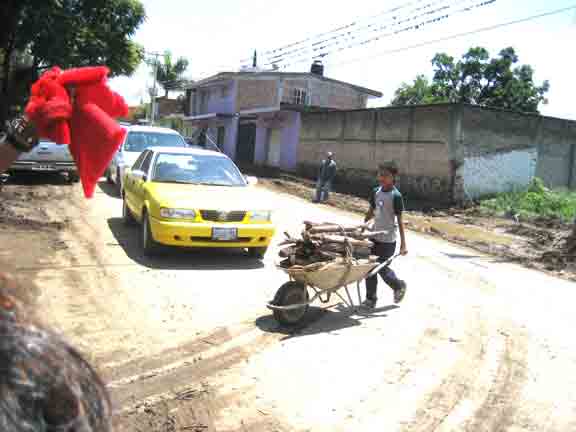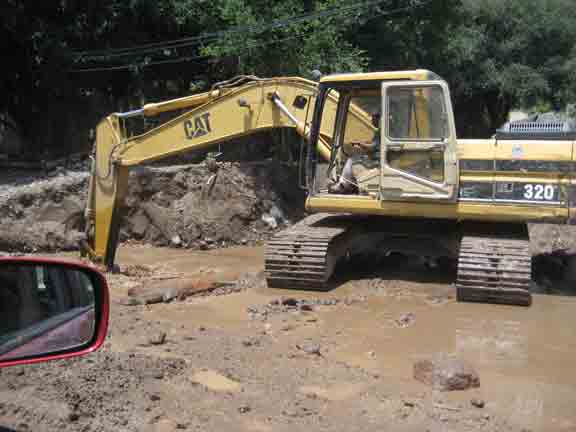All night it rained in Jocotepec, my small town in Mexico. Rain isn’t unusual, but this was different. It was heavy. It didn’t stop. Come morning, my wife and I looked out the window and saw inches of brown water sluicing down the sloping street from the mountain.
About nine o’clock that morning the speakers on the church tower began: “Necesitamos personas, ropa, comida. Personas, ropa….” We need people, clothes, food. Something had happened.
The towns of our region—Chapala, Ajijic, San Juan Cosala, Jocotepec—lie along the north shore of Lake Chapala, squeezed into a narrow strip between the mountains, or high hills anyway, and the lake. You can walk from the shore to the upslope in about five minutes. The hills, which have little vegetation, are dotted with roundish boulders stuck in raw earth. The vegetation that once held the earth in place has been eaten by goats, which graze in the hills. When enough rain washes away the soil, the rocks begin to roll. This had happened.
A moving mass of boulders—first small rocks, then those of basketball size, then some as large as Volkswagens—had ploughed through San Juan Cosala. A commonly quoted figure, entirely plausible, is that two hundred houses were destroyed. Nobody was killed I think, but houses were crushed or filled to the ceilings with mud. It was a massive disaster in a small way. Katrina’s baby sister, call it.
We didn’t know how bad it was.
At about eleven Violeta and I went to the square to offer our services and to buy food to contribute. By that time a food-distribution center in the church was accepting donations and sending them to the scene in the trucks of volunteers. The clothing collection-point was busy. The town gym had been turned into temporary housing for the shelterless. When your house has eight-foot ceilings and six feet of mud inside, a gym looks pretty good. At a desk in the gym volunteers lined up, waiting to be assigned jobs.
The only road along the lake was blocked
by police to avoid interference with rescue teams, whose trucks came and
went. Late that afternoon Vi and I managed to get to San Juan. Things were
horrendous. Walls of mud and rock had rolled down the vertical streets and
across the main road, leaving hills of debris. We saw a pickup truck
squashed like an accordion.

Sub-optimal. Lowers property
values.

Street scene, San Juan
Heavy equipment was arriving from wherever
Jalisco, our state, keeps such things. What in the military would be called
tank transporters, huge flatbed trucks, roared down the lakeside road. We
saw bulldozers, front-end loaders, all sorts of big earthmovers painted
yellow. Their scoops made them look like nightmare scorpions. A few were
already working to clear the rubble and others appeared at intervals. Heavy
white dump trucks labeled “Department of Public Works” waited to be filled.
Mexico is corrupt and does not run quite like a well-oiled Rolex, yet the
government does a much better job than Americans would ever credit. And
sometimes better than Americans do.
The response had been fast and vigorous, and participation almost universal. Doctors had come from neighboring towns, though miraculously they were not much needed. A businessman in Chapala had donated a large truck full of five-gallon garrafones of bottled water. Nobody required them to do these things. They just did.
Next day the streets were lined with men with shovels and the big cats worked with much clunking of metal against rock and growling of diesels. We talked to a man whose house had been on a sloping street. It no longer was, or at any rate was no longer a house. He said he had heard an odd rattling outside, looked out, and saw a river of water and rocks like softballs racing downhill. A couple of bigger rocks came by. He figured that out, and his family went through a downslope window and ran hard. No injuries. No house, either.
People we talked to did not seem to regard themselves as victims. Rather they had a disaster on their hands. There is a difference. We saw nobody sitting about, waiting for someone to take care of them. They were not overjoyed, but neither did they seem beaten down or passive.
The place was a mess. It needed cleaning
up. They set about cleaning it up.

Self-reliance. This kid is not
with FEMA.
The upper part of San Juan is the Raquet
Club, a posh gringo retirement community. Vi and I and Natalia, my
stepdaughter, climbed through streets awash in boulders that hadn’t been
there before and found pricy houses wrecked. Not good, but not as bad as it
could have been. Gringos have money, and some of them probably had
insurance. Mexicans in San Juan have neither. They had much to complain
about, but didn’t, being too busy trying to dig out.
We walked further up the hill, finding more streets entirely clogged with mud, rocks, detritus. Around reasonably intact houses kids looked at the surrounding destruction, more interested than dismayed. On the side of the mountain we could see what seemed to be the path taken by the boulders in their downhill run. Finally we had enough and went back.
A month or so later San Juan seemed back to normal, though I’m not sure where those went whose homes were unsalvageable. Kids ran perilously close to the edge of the road as usual and stores were open. I thought about the pole-axed helplessness of New Orleans, the bureaucratized uselessness of FEMA, and wondered where the Third World lay.
So far as I know, nothing of the disaster appeared in the US media, apart from a reported one-sentence mention in a world wrap-up on Fox News. The town asked for no outside help beyond the state level, and got none. There was no looting, no incompetent federal agencies to gum things up. The town was devastated and so, with far fewer resources than the United States could bring to bear, they undevastated it as best they could, which was pretty well, and went about their business.
That’s how a small Mexican town handled
its Katrina.

One day after the disaster. These things were all over the place. Any resemblance to New Orleans is purely nonexistent.